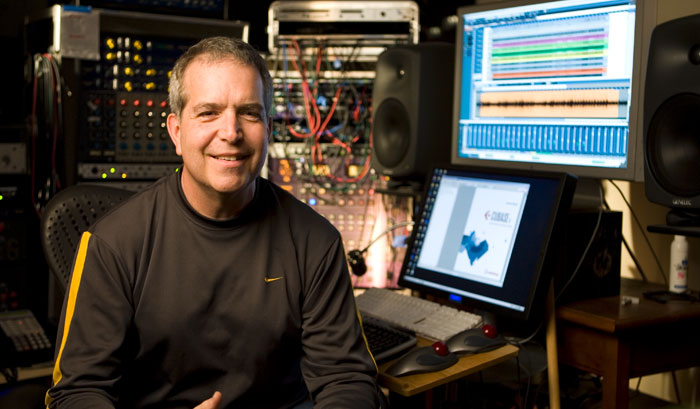


Talk about mass production!
In the last few days David Kahne has finished work on Kelly Clarkson's upcoming My December disc, mixed an album by British rock up-and-comers the Dead 60s, and collaborated with Regina Spektor on the follow-up to her breakthrough album Begin to Hope, which he also produced. Now he's back at work on Paul McCartney's Memory Almost Full, a project nearing completion after three years.
I use Cubase for all my audio editing. The onboard plug-ins are just amazing, and there are really great synthesizers.
Musicians and engineers who have worked with Kahne marvel at his ability to focus on the minutest production details without losing sight of the big picture. "Well, I've spent a tremendous amount of time trying to develop that ability," he allows. "It's nice to be able to grow in a business where you're usually tossed under a bus by the time you're 30."
It might have turned out differently. The son of a career Air Force officer, David grew up at bases around the country. As a teen he tutored himself in playing, arranging, and music theory. But his dreams of becoming a successful recording artist were dashed when Kahne heard a song by his recently signed band--an act he prefers not to name--on the radio. "I had to pull over to the side of the road and cry because it sounded so bad," he recalls. "I realized I couldn't do what an artist needs to do. I just couldn't create that deep emotion."
But instead of quitting, Kahne refocused. "I figured, if I couldn't do it as an artist, maybe I could do it as an arranger or engineer or writer or producer. So I got a job answering phones in a studio, and I went in every night and learned the gear." His break came when he produced "Drivin'," an indie hit for San Francisco new-wavers Pearl Harbor and the Explosions.
Kahne credits his roots as a musician with much of his production success: "Being a musician first gave me the ability to have an idea and follow it through all the way. My arranging background is important to me, too. That's where it all comes together, if the songs are good."
Kahne places much importance on pre-production. "I always spend a lot of time preparing with the artists before we go in to record," he says. "With the Dead 60s, we rehearsed for three weeks, going over every single bar of every song over and over again. After that, they were really ready--we did all the tracking in four days. With Kelly Clarkson, we spent three months listening through all her songs and preparing 'models' for them. We'd try different things with different sounds. I'd see how the lines work. Figure out where the voice sits. Test all the registers. Make sure the guitars were in the right places. I always try to do that until I have something pretty definite."
Over the years, Kahne has used every leading digital audio program, but he now prefers Steinberg's Cubase 4. "The first time I heard the upgraded audio engine in Nuendo, I switched. Then they added the Nuendo audio engine to Cubase, so now I use Cubase for all my audio editing. The onboard plug-ins are just amazing, and there are really great synthesizers. I've been using Hypersonic and the others as my first-choice synths. Their reach is so broad--they have great old-school sounding things, a huge number of samples, everything. I also like the great library for HALion One. It incorporates a lot of the Yamaha library--it's a great example of the Yamaha/Steinberg synergy. On top of that, Cubase is ridiculously inexpensive."
Kahne makes no bones about it: He loves his gig. "I enjoy work more than I ever have. I love the variety of artists I get to work with. I love keeping up with the gear. Working is fun!" He seems particularly enthused about the McCartney disc. "People are saying it's one of the best albums he's made in his life. He's singing at the top of his game, and the writing's great."
Which other discs are closest to Kahne's heart? "Definitely the Regina Spektor album," he replies. "The Sublime album with 'What I Got' on it. Fishbone's Truth and Soul. The second Sugar Ray album. I love the expressiveness of those albums. It's the sound of someone expressing something meaningful without artifice, completely free and open. I think of it like this: Imagine you're walking through a forest at night. You can't see anything, but you hear a baby cry over to the side. Immediately, a whole story comes into your mind. There's nothing but a sound, but that sound creates an entire world in your mind."
























